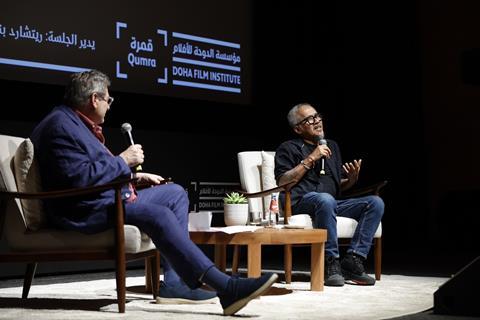
Filipino director Lav Diaz says he is preparing an adaptation of an obscure Alexandre Dumas work, to shoot later this year.
Without naming the work, Diaz told Screen the film was scheduled to shoot at the start of this year before the director became unwell. Now recovered, he is looking to shoot it towards the end of 2025.
Diaz’s previous films include 2022’s When The Waves Are Gone, a loose adaptation of Dumas’s most famous work The Count of Monte Cristo.
The director also hopes a 165-minute version of Magellan, his feature film starring Gael Garcia Bernal as Portuguese explorer Ferdinand Magellan, will debut at Cannes next month.
Formerly Beatrice, The Wife, the film has been retitled Magellan, with an as-yet-undetermined longer title. Diaz has shifted the focus away from Magellan’s relationship with his wife Beatrice, to take in more of the perspective of the conquered Malay people.
“It’s not just the perspective of the European anymore,” Diaz told Screen. “It’s a more advanced perspective of Southeast Asia. It’s always the white man’s burden every time we do historical things connected with Europe or America; I want to balance it.”
The film stars Garcia Bernal alongside a Portuguese actress as Beatrice, with Filipino, Portuguese and Spanish actors rounding out the cast.
Speaking at the Doha Film Institute’s Qumra lab where he is a Master, Diaz said he “just finished” the film, which is “all about death”.
Diaz, who is known for his long films, told the Qumra audience that his cut is “around nine hours.”
“Some festivals, maybe they just want to show three hours, so the producers compromise, so they will see three hours of it,” said Diaz. “But I will have the full cut.”
“[The producers] are trying some very imposing festival in France,” said Diaz, referring to Cannes. “But I don’t know. They will be having some headache about it.”
Magellan has been in the works for several years, with Portuguese production outfit Rosa Filmes presenting it on its slate in 2019. It is also produced by Spain’s Andergraun Films, Black Cap Pictures from the Philippines, and Volos Films from Taiwan.
Asked about the presence of violence in his work, Diaz said, “It’s the nature of my culture. Filipinos are very violent. Magellan found out – he came here, they killed him.”
Cannes Film Festival will reveal the majority of its lineup this Thursday, April 10. If selected, it would be Diaz’s first time in Cannes since The Halt debuted in Directors’ Fortnight in 2019; while he was last in Official Selection with Norte, the End of History in 2013.
His most recent feature Phantosmia started out of competition at Venice last year.
Long time coming
Previous Diaz films include Heremias (519 minutes), Death in the Land of Encantos (541 minutes) and Evolution of a Filipino Family (624 minutes). “My films tend to be long because I want to fulfil the characters well,” said Diaz, comparing it to “a novel where you have big spaces” such as those by Tolstoy or Dostoyevsky.
“That’s the point of the work, you have to put spaces, you have to breath. Don’t put a lot of music from these motherfuckers; you have to show life, you have to experience life. The spaces are important.”
Speaking to Screen at Qumra, Diaz said he was pleased by popularity of Brady Corbet’s 216-minute The Brutalist, despite not yet having seen the film. “It’s good. Cinema is going that way, it’s opening, embracing a freer length. It’s not true that the duration or capacity of a human being to watch movies or television is just two hours. It’s an industry perspective.”
The Brutalist included a 15-minute interval in all its theatrical screenings. Diaz said he would not hard-code an interval into any of his films, but is happy for festival and cinema screenings to include breaks. People can “make love, make some food” during his films, the director said.
Diaz said he doesn’t identify his work with the description ‘slow cinema’. “It’s not annoying, but I don’t believe in that title,” said the director. “We don’t follow the conventional two hours, one-and-a-half hours – it’s just a new way of seeing things.”
Asked to compare his feature films to the recent trend for miniseries, Diaz said, “They’re practically the same. There’s just some cutting into chapters.”
The long takes that characterise Diaz’s work are also a result of laziness, the director said. “My camera is not moving any more, I’m lazier and lazier. I want to see more in the discussion, debate. We’re just watching what’s going on. I don’t want to impose.”
“It’s a struggle for me to understand the process of cinema with fast cuts,” said Diaz. “I want to unify space and time in one shot, just like life. To understand not just what’s happening – to feel it more.”
He criticised US president Donald Trump on several occasions during the two-hour session, as well as other current and recent political leaders. “America is very cold,” he said, remembering shooting 2001 feature Batang West Side in New York. “It’s getting colder with Trump, motherfucking Trump. Fuck him. He must go, today, this very moment.”
The 21-year rule of former Filipino dictator Ferdinand Marcos continues to inform the director’s work, with his son Ferdinand ‘Bongbong’ Marcos Jr now leader of the country. “The worst problem of the Philippines is still ignorance,” said Diaz. “The world’s ignorance is getting higher. We should act fast. Batang West Side projects all of humanities struggles. With Putin, with Assad, with all those motherfuckers. The fascists are here now.”
He also offered brusque advice to the emerging filmmakers in the Qumra audience. “It’s all a struggle,” said Diaz. “Do it alone. Fuck all the institutions – deal with life and poetry.”
The next Qumra masterclass will take place on Tuesday, April 8 from Mexican costume designer Anna Terrazas.







![The Brightest SunScreen[Courtesy HKIFF]](https://d1nslcd7m2225b.cloudfront.net/Pictures/274x183/3/5/0/1448350_thebrightestsunscreencourtesyhkiff_312678.jpg)

















No comments yet